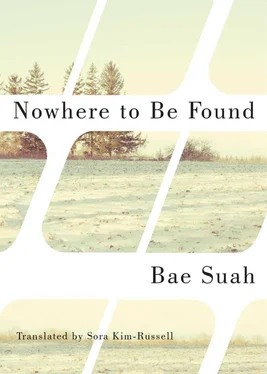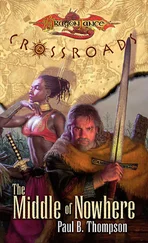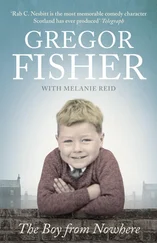“Just drop it and let’s go,” he said.
At the market he bought me a plate of mandu . Then, to my utter astonishment, he bought me a washing machine. I was so overjoyed that I couldn’t stop grinning. A seventeen-year-old girl was so happy about receiving a washing machine that she could have cried. Later I learned that he had used the deposit from the apartment he’d rented with his girlfriend to buy it for me. He left home that night without eating dinner. Each step he took seemed to kick up a breeze.
At some point that same year, Cheolsu joined the army.
He sent me the occasional letter while he was in the service. They were very brief. Most were about clouds or the weather. If boys could be divided into different categories, then Cheolsu was a mineral. That was his approach to life. He was neither dishonest nor dramatic. He wasn’t my one and only boyfriend, and I wasn’t his one and only girlfriend. He didn’t attend lectures on political economy or register for study groups on proletariat literature, but he also wasn’t hung up on studying for the civil service exam or professional exams like other people. He just looked blank sometimes. While everyone else was tormented by a restless anxiety, like the dizziness you feel on a spring day, which made them question what they were doing with their lives, Cheolsu was yawning and working on a crossword puzzle. He knew how to accept the tedium without the ennui.
I could count about a dozen or so girls whom Cheolsu had dated back then. His interest in them was closer to simple curiosity than passion. He took them out to dinner and coffee, went with them to the movies, and even joined them at the occasional protest rally or demonstration. But I don’t believe that any of it — not the movies or the demonstrations or the jazz concerts at Janus or the French conversation classes at Alliance Française — really moved him. If someone asked him how the movie was that he’d watched with a girl the day before, he would answer, Okay, I guess. I forgot the title, but it’s about a spy. Or maybe a beggar? His woman leaves him or dies or something. I don’t know. I fell asleep and missed the ending. Cheolsu’s response never varied, regardless of whether it was a trendy Hollywood movie or a 1960s French film or a live play put on by the Yeonwoo Theater Company. And he always ended with the same words: I’m not really sure.
Among the girls he’d dated, one had snow-white skin and eyes that looked good behind glasses. She spent all her time going back and forth between home and the lecture hall, private French lessons, and the French literature section in the library, as if the academic life were the only one worth living. Yet I don’t believe she had any particularly grand dreams for herself. She later married an ordinary salaryman (who was not from France) and lived off his wages in Seoul, where she had no use for all that French. Then there was the loud, not-all-that-pretty girl with no sense of feminine wiles who later became a math teacher; the fervent socialist; the intellectual beauty who attended a top private university; the jealous girl; and the girl who was called the Black Hole because of her reputation for routinely going through multiple guys in one night. Each time Cheolsu broke up with another, he said the same thing.
I’m not really sure.
Basic training ended and Cheolsu came home on furlough. He’d changed. I couldn’t explain exactly how he’d changed, but his face was tanned as dark as a laborer’s and only his eyes sparkled. His hands were rough and he spoke less frequently. Cheolsu sat down next to me with a can of Coke in his hand.
“Why are you so busy all the time?” The first words out of his mouth were a complaint. “You didn’t reply to any of my letters.”
“I was working.”
“Give me your hand.”
He stroked my hand. I knew what he wanted. This new Cheolsu didn’t waste any time. His lips fumbled their way toward me. It was an emotionless and unthrilling first kiss.
“Want to go back to my place?” he asked.
He’d been to my house several times, but I’d never gone to his. It was too far away, and I knew he lived with his parents and younger sister. I hesitated because I had to work at the restaurant that night, but then said yes because I didn’t want to let him down after he’d gotten out on furlough. He took me by the hand and stood up. In the bus on the way to his house, he sat me on his lap and stared into my eyes. I stroked his closely cropped hair. The gray landscape outside the window flowed past listlessly. Cheolsu said my pink sweater looked good on me. That was the only thing he said the entire way.
No one was home. His mother was at a relative’s wedding and his little sister was still at school. In the living room an old carpet covered the floor and an unnaturally large television set clashed with an imitation Van Gogh hanging on the wall. Cheolsu made coffee and put on a record, some Jamaican artist I didn’t recognize. Time was passing dully and I was getting antsy.
“Want to see my room?” Cheolsu finally asked.
I was dancing around to the thumping reggae music. Cheolsu had touched the coffee cup to his lips but didn’t drink any. When he stopped the record, the grandfather clock on the wall suddenly rang out: deng, deng, deng, deng . The pale, hazy afternoon sunlight seeped through the window, and the dust rising off the carpet blurred my vision. The room was neither bright nor dark.
“My furlough ends the day after tomorrow,” Cheolsu said as we went into his room.
Heavy winter drapes covered the window. A desk, a bookcase crammed with economics textbooks, a wardrobe, a bed, a pair of dumbbells: it was the same stuff you would find in any guy’s room. In the low light I perused Cheolsu’s books. I didn’t recognize any of the titles. He didn’t have any of the usual paperbacks or light essay collections or even any porn magazines stashed just out of sight. A glass top and a thin layer of dust that had accumulated during his four months away in the army covered the desk.
I’d known Cheolsu since high school.
He was two years older than I was and what I can only describe as ordinary. When I was a senior in high school, I worked part-time as a clerk at the local government office. Cheolsu was a college student and had come to the office on an errand. He earned some of the highest grades in his class and so it wouldn’t be a stretch to say that he was a model student. By the time I finished college we weren’t just friends, but we weren’t exactly going steady either. What makes a relationship special? You talk on the phone every night before bed, hang out together every weekend, see new movies, remember each other’s birthdays, and, assuming there are no particular problems, introduce one another to your parents at your graduation ceremonies. You think of each other when you’re having a drink or watching porn, and gradually you come to understand all of life’s standards through each other. When you define it that way, then Cheolsu and I were not special. He didn’t make me feel anything, and I didn’t make him feel anything. But oddly enough Cheolsu’s friends and my friends all thought of us as a couple. Even my brother and sister thought so. They’ll get married someday , they all thought. Neither Cheolsu nor I had ever talked about that, nor did we feel any particular need to. But perhaps after more time had passed and Cheolsu had matured and grown older and sprouted a few white hairs and wearied of time, and I too had wrinkled lips and ruined looks and had reached an age where there was no longer any trace of a flirtatious smile and no one would find me pretty, then maybe we truly would end up married.
Читать дальше












